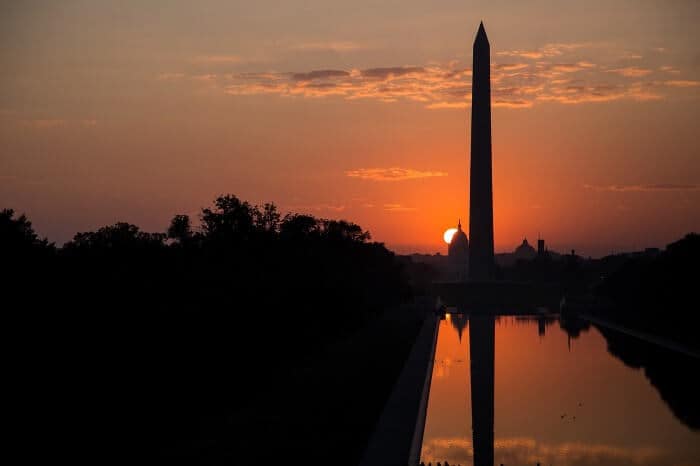
Washington DC is not only the capital of the United States and the seat of government, it’s also a city which is growing rapidly, attracting young, educated people from the country and the world. It’s a city which is full of history, good food and wine, upmarket neighbourhoods and, it’s expensive.
If you are considering moving to Washington DC, the various costs listed below will help you make an informed decision on what costs are involved when moving and living in the capital of the United States.
Quick Washington Facts:
- Population: 7.7 million (2021)
- Official Language: English (de facto) with over 60 other languages being spoken, including French, Spanish, Russian, Thai, Vietnamese and Hebrew.
- GDP Per Capita: $67,000+ (2021)
- Voting: Washington DC residents couldn’t vote for the President until 1961.
- Currency: US Dollar (US$). As of mid 2023, £1 = $1.20, €1 = $1.07, $1 CAD = $0.74, $1 AUD = $0.68
1. Moving and Shipping Costs to Washington, DC
Below are some sample container shipping costs to Washington, DC from other major world cities. Just keep in mind they only reflect the shipping portion of the cost and not the full moving costs.
- New York City – $108+
- Los Angeles – $717+
- Canada (Vancouver) – $1,531+
- UK (London) – $1,263+
- Australia (Sydney) – $2,843+
- Ireland (Dublin) – $1,401+
- New Zealand (Auckland) – $3,315+
- Hong Kong – $1,706+
- Dubai – $2,601+
- Singapore – $2,671+
Source: WorldFreightRates.com
You can save money by comparing moving companies using our moving quote form above.
2. Washington DC Housing Costs
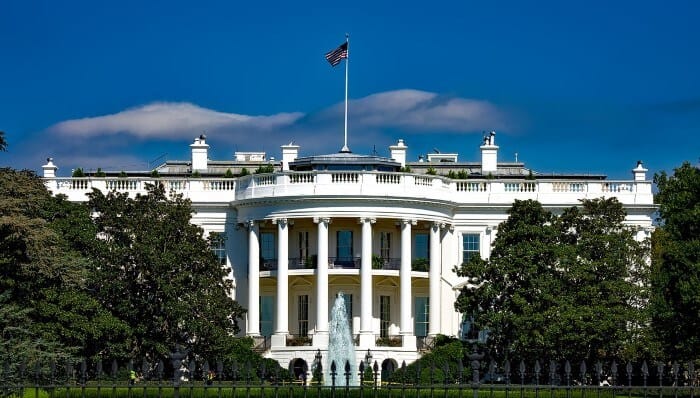
Whether you are buying or renting, housing in DC is expensive. If you are moving from a State with reasonably priced housing, the prices here will be a bit of a shock. On the other hand, even though the cost of living is high, salaries are also high.
Monthly Rental Prices in Washington DC
- 1 bedroom apartment in City Centre: $1,600+
- 1 bedroom apartment outside the City Centre: $1,200+
- 3 bedroom apartment in City Centre: $3,000+
- 3 bedroom apartment outside the City Centre: $2,100+
Washington DC Home Purchase Prices
- Price per square metre (10.7 square feet) to buy in City Centre: $6,200+
- Price per square metre (10.7 square feet) to buy outside City: $2,900+
Washington DC Housing Cost Comparison
This is how rents in Washington DC compare with other cities around the globe.
London is 6.86% cheaper
New York is 31.47% more expensive
Los Angeles is 11.02% cheaper
Toronto is 47.07% cheaper
Sydney is 13.24% cheaper
Paris is 43.66% cheaper
Dubai is 3.87% cheaper
Source: Numbeo
How to Save on Housing Costs
- Share an Apartment or House. A cheaper option is to share a room, just remember that sharing usually means sharing a bathroom as well. Have a look at the following sites to find your perfect roommate: Easyroommate, Kangaroom, Craigslist, Metro Roommates and Room LaLa.
- Different Areas – Different Prices. If you want to live in the hub of the city, then you will have to rent as there is virtually no property for sale. This is where the students like to live, close to campus and close to public transport. The south-eastern suburbs are also popular with people who want to rent. Homeowners tend to live in the northeast and northwest of the city. Georgetown is the most expensive neighbourhood. One of the cheapest areas is the Navy Yard which has been redeveloped with apartments, restaurants and small malls.
3. Washington DC Food, Grocery and Restaurant Costs
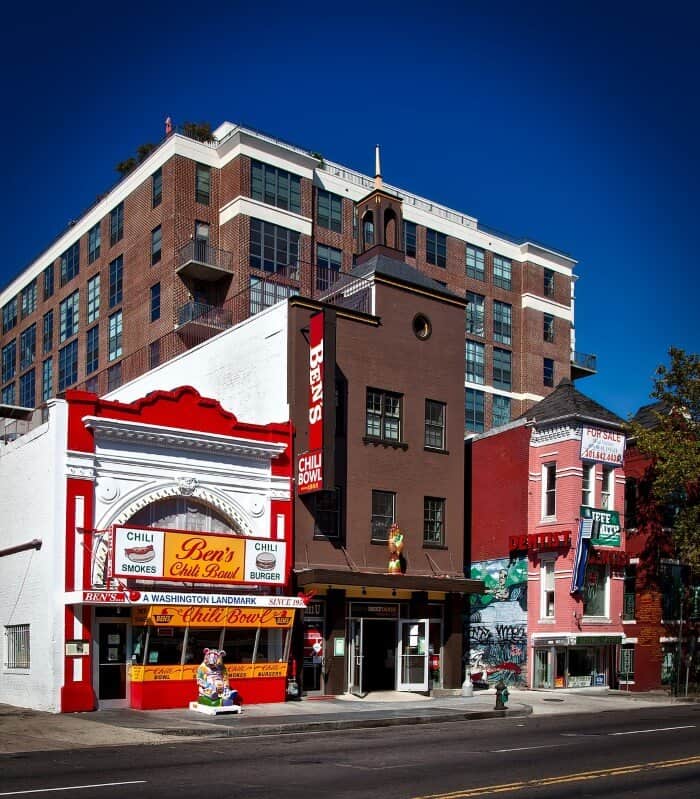
Washington DC has some of the best restaurants in the United States. Practically every type of cuisine is represented from Mexican tacos to fine dining French style. The grocery shops and supermarkets carry a wide range of foods and fresh produce to support this love of food.
- Inexpensive Restaurant: $12 – $20
- Takeout Coffee: $3.50 – $5.00
- Bottle of Coke: $1.50 – $2.50
- 1L of milk: $0.79 – $1.32
- Loaf of Bread: $2.20 – $4.41
- 12 Eggs: $2.00 – $4.50
- 1kg Chicken: $7.28 – $17.61
- 1kg Beef: $8.27 – $22.05
- 1kg Apples: $2.20 – $6.61
- 1kg White Rice: $2.20 – $6.60
This is how restaurants and food prices compare with other major cities in the world.
- London restaurants are 2.56% more expensive and groceries are 32.27% cheaper than Washington DC.
- New York restaurants are 12.93% more expensive and groceries are 11.46% more expensive than Washington DC.
- Los Angeles restaurants are 7.57% cheaper and groceries are 14.88% cheaper than Washington DC.
- Toronto restaurants are 25.17% cheaper and groceries are 28.86% cheaper than Washington DC.
- Sydney restaurants are 16.42% cheaper and groceries are 10.35% cheaper than Washington DC.
- Paris restaurants are 8.00% cheaper and groceries are 14.68% cheaper than Washington DC.
- Dubai restaurants are 26.72% cheaper and groceries are 34.74% cheaper than Washington DC.
Source: Numbeo
Bonus Tips for Cheaper Food, Restaurants and Groceries
- Know Your Supermarkets: Washington DC has many independently owned grocery stores as well as the usual supermarket chains. There are also lots of farmers’ markets and organic and whole food shops. Popular supermarkets are Whole Foods Market, Trader Joe’s, Capital Supermarket, Glen’s Garden Market and Dean and DeLuca for those who enjoy the finer things in life.
- Find Cheap Eats: There are plenty of places to find cheap eats in Washington DC. Have a look at the following websites to find the perfect restaurant for a special night out – TripAdvisor, Washingtonian, Serious Eats, Travel and Leisure and Huffington Post.
4. Washington DC Alcohol Costs
Washington DC has a large variety of excellent bars and clubs, from trendy jazz clubs, clubs to dance the night away and quiet, sophisticated clubs more suited to romantic evenings.
- Pint (0.5L) domestic beer at a restaurant/pub: $5.50 – $8.00
- Bottle of imported beer at a restaurant/pub: $6.00 – $9.00
- Pint (0.5L) domestic beer at a supermarket: $1.00 – $5.00
- Bottle of imported beer at a supermarket: $2.00 – $7.00
- Mid-range bottle of wine at a supermarket: $15.00 – $24.00
How to drink for less in Washington DC
- Keep an eye on the local papers and websites for specials over weekends and public holidays.
- It is said that Washington DC has more establishments with happy hours, than any other town or city in the United States. Have a look at the following sites to find your drinking bargain of the day – Four Square, DC Eater, Timeout, Streetwise and The Washington Post.
5. Washington Transportation Fares
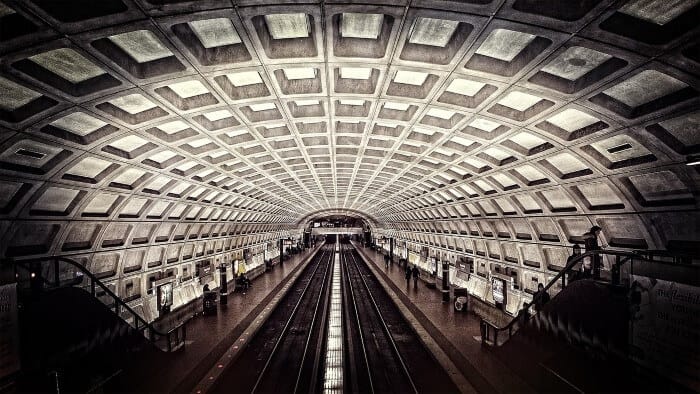
The WMATA runs the bus and rail system in Washington DC. The MetroRail system is exceptionally efficient and runs from 5.30 am to midnight during the week, with trains every six to 12 minutes depending on the time of day. At weekends the service runs from 7.00 am to 3.00 am. MetroBus runs the same hours as MetroRail and tickets can be bought which cover both modes of transport.
Here are some example ticket costs.
- Adult Single Metro – $2.75
- One-day ticket – $14
- Monthly season ticket, unlimited – $200
How to save money on public transport
- Buy a SmarTrip card and get reduced fares
- Buy a 7-day pass for $57.50
- Buy a bike. Depending on where you live and work, cycling around the city may be an option. It is definitely a bike-friendly city.
- If you live relatively close to where you work, try walking.
6. Cost of Internet in Washington DC
Internet prices in the States are expensive compared with many other countries in the world. Here are some sample broadband internet prices from mid-2023 for unlimited downloads, based on a 12-month contract:
- Sprint: $50 a month (Unlimited high speed except for streaming gaming up to 8mb)
- AT & T: $20 a month (50mb fibre)
- Verizon: $80 a month
7. Cost of Clothing, Personal Items, Gym and Leisure
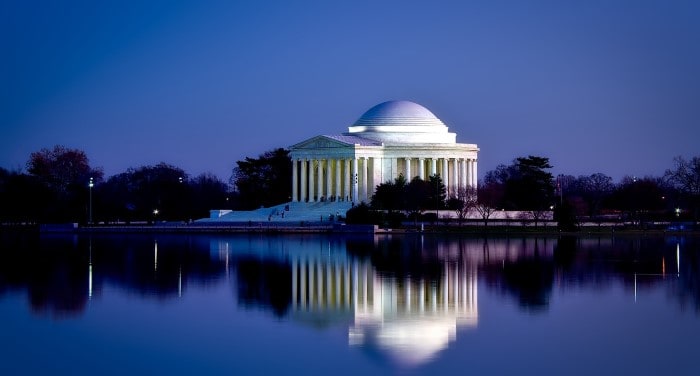
The average yearly temperature in Washington, US is around 12 degrees Celsius. The coldest month is typically January, with temperatures averaging around 3 degrees Celsius, while the hottest month is July, with temperatures averaging around 24 degrees Celsius. The wettest month is often May, with higher rainfall amounts.
Here are some clothing prices, together with other useful prices.
- Pair of Jeans: $30 – $60
- Summer Dress: $25 – $49
- Running Shoes (Trainers): $60 – $100
- Business Shoes: $75 – $200
- Short Doctor’s visit (15 mins): $130
- Deodorant: $3.50
- Shampoo: $4.29
- Toilet Paper (4 rolls): $3.13
- Gym membership: $30-$95 per month
- Movie (cinema) ticket: $12-$15
Source: Numbeo and Expatistan
8. Cost of Owning a Car and Driving a Car in Washington DC
Many people in DC only use their cars on weekends as the public transportation system is so good.
If you’re moving to Washington DC from within the US, you’ll be able to keep your license but need to update your address to your new one.
You can drive on a foreign license for up to 12 months as a tourist but after that, you will need to get an American license. If you are working or studying in the US, you can drive on your foreign license for 30 days. If you want to exchange your foreign driver’s license you have to follow the process here.
Here are some other sample costs of owning and operating a car in Washington DC:
- Volkswagen Golf: $20,000
- 1 litre (¼ gallon) of gas (petrol): $0.67
- Other fees (if any): The average cost of state and local taxes, license, title and registration fees is $665 per annum
Source: Expatistan, AAA Study
Ways to save money driving in Washington DC
- Car sharing or pooling is one way to save money. Try Car Pool World, Enterprise Carshare, Zipcar and GodcGo.
- Taxis can sometimes be a cheaper option, especially if you are going to have to park all day. Try Uber and Lyft.
Need your car/vehicle moved to Washington, DC? Then read our guide to Car Transport & Vehicle Shipping
9. Taxes in Washington, DC
Washington DC’s income tax currently stands at:
- Not over $10,000 = 4% of the taxable income
- Over $10,000 but not over $40,000 = $400, plus 6% of the excess over $10,000.
- Over $40,000 but not over $60,000 = $2,200, plus 6.5% of the excess over $40,000.
- Over $60,000 but not over $350,000 = $3,500, plus 8.5% of the excess over $60,000.
- Over $350,000 but not over $1,000,000 = $28,150, plus 8.75% of the excess above $350,000.
- Over $1,000,000 = $82,025, plus 8.95% of the excess above $1,000,000.
The sales tax in Washington, US varies by location, with the state sales tax rate at 6.5% and additional local sales taxes ranging from 0.5% to 4%. It is important to note that sales tax rates can differ between different cities and counties within the state.
If you own your home, you will be subject to property tax based on the area in which you live and the size of the property you live in. Learn more about property tax in Washington at SmartAsset.
Finally, if you decide to buy an apartment or house in Washington you’ll have to pay real estate transfer tax.
10. Flight Costs from Washington DC
If you do make the move to Washington, here’s approximately how much it will cost to fly to other major world cities based on the lowest, one-way fares from Skyscanner as of mid-2023:
- London: $200
- New York: $80
- Los Angeles: $100
- Toronto: $90
- Vancouver: $180
- Dubai: $420
- Sydney: $500
- Melbourne: $580
- Cape Town: $585
- Hong Kong: $690
Other Washington DC Relocation Tips
The costs and pricing above should give you a good idea of the cost of living in Washington but perhaps the following extra tips will make your move go smoothly.
11. Relocating to Washington DC Alone
Moving anywhere can be a lonely experience, but moving to a new city can be rather daunting. Here are a few tips for settling in Washington DC.
- Meetups: Washington has numerous Meetup groups covering a wide range of activities from hiking to baby and toddler groups.
- Attend local events: There is always something going on in Washington DC and many of the activities are free. Have a look at these sites to get inspiration on what to do during your free time – TripAdvisor, Washington.org, Travel US and Travel and Leisure.
12. Moving to Washington with a Family
Washington, US is generally considered a family-friendly location, with a wide range of activities and attractions suitable for all ages. The crime rate in the city varies depending on the specific neighbourhood, but overall, the city has implemented measures to ensure the safety and well-being of its residents and visitors.
- New Parents (or parents-to-be): Check out Washington Parent and The Northwest Centre for advice, courses and ways to meet other parents or parents-to-be.
- Live in a Family-Friendly Area: Georgetown is one of the best areas for families and also the most expensive. It has excellent schools, lots of green spaces, shopping, and housing and is steeped in history. Glover Park is a favourite with military families. The Palisades is a quiet, family-orientated suburb. Other family-friendly areas are DuPont Circle, Chevy Chase, Friendship Heights, Capitol Hill, American University Park and Spring Valley (Learn more at CubeSmart Family Friendly Areas in Washington).
- Find Things to do with the Kids: There is so much for children to do in Washington and lots of it is free. Have a look at My Little Nomads, Washington.org, DC Cool Kids and Lonely Planet.
13. Moving to Washington DC for Work
Moving for work is one of the most common reasons people choose to move. While it is possible to move without a job, it makes sense to ensure there are jobs in your field before you make the move.
The main industries in Washington include technology, aerospace, agriculture, healthcare, and tourism. The state has a diverse economy and is home to major companies such as Microsoft, Amazon, Boeing, and Starbucks. The unemployment rate in Washington state is approximately 5.1%.
Here are a few things to consider when moving for work:
- Salary: Salaries in Washington DC are high. The costs we outlined above should give you a rough idea of how much more you’ll want to make the move worthwhile. You can also check salary ranges on sites such as Glassdoor and Payscale.
- How to Find Work: If you want to have a job lined up before you move to Washington, but aren’t sure where to begin, the following sites are good places to start: Monster, Indeed, Snag a Job, Craigslist and Career Builder. You may also want to google recruiters in your industry, as they can often help land you some initial interviews as well.
14. Moving to Washington from Australia
There’s a large group of Australians living and working in Washington, mostly expats on fixed contracts working in the diplomatic corps, media and in the private sector.
- Size Comparison: If you compare the population size of Washington DC with a city in Australia, then the closest would be the Gold Coast.
- Join Expat Groups: AWA, InterNations and MeetUp offer ways of meeting up with other Australians in Washington DC.
15. Moving to Washington DC from Canada
There are many Canadians living in Washington. Some families have been living there for generations and others are drawn by the politics and vibe of the city.
- Size Comparison: If you compare the population size of Washington DC with the nearest in size in Canada, you would be looking at Hamilton.
- Join Expat Groups: Meeting up with fellow Canadians helps the moving process. Link up through sites such as Internations, Meetup and Canadian Expat Network.
16. Moving to Washington DC from the United Kingdom
Washington DC has a fair number of British expats living there, working in media, education and other sectors. These expats are usually there on fixed contracts and are not permanent residents. If you’re considering joining them, here are a few bonus tips:
- Size Comparison: If you look at the population size of Washington DC, the nearest UK city in population size is Leeds.
- Join Expat Groups: If you want to get together with others from the UK who are experiencing the United States capital city, then go to Internations, Facebook and Meetup.
Hopefully, the tips and costs above are helpful. If want to get started pricing out how much it will cost you to move to Washington DC you can start by comparing moving quotes here.
Guides to moving and living in other American cities